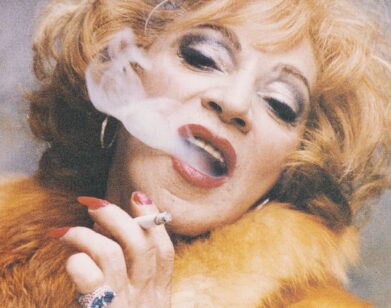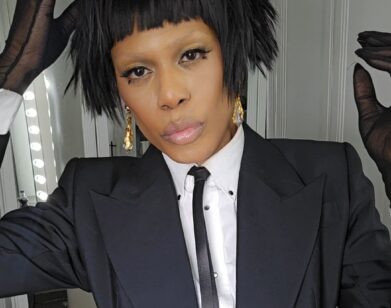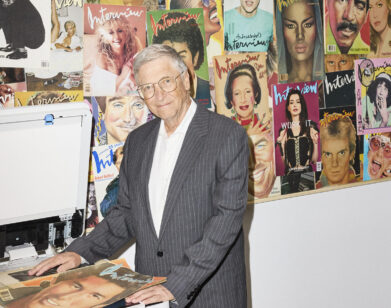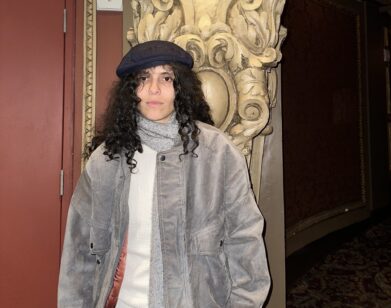Rob Spillman
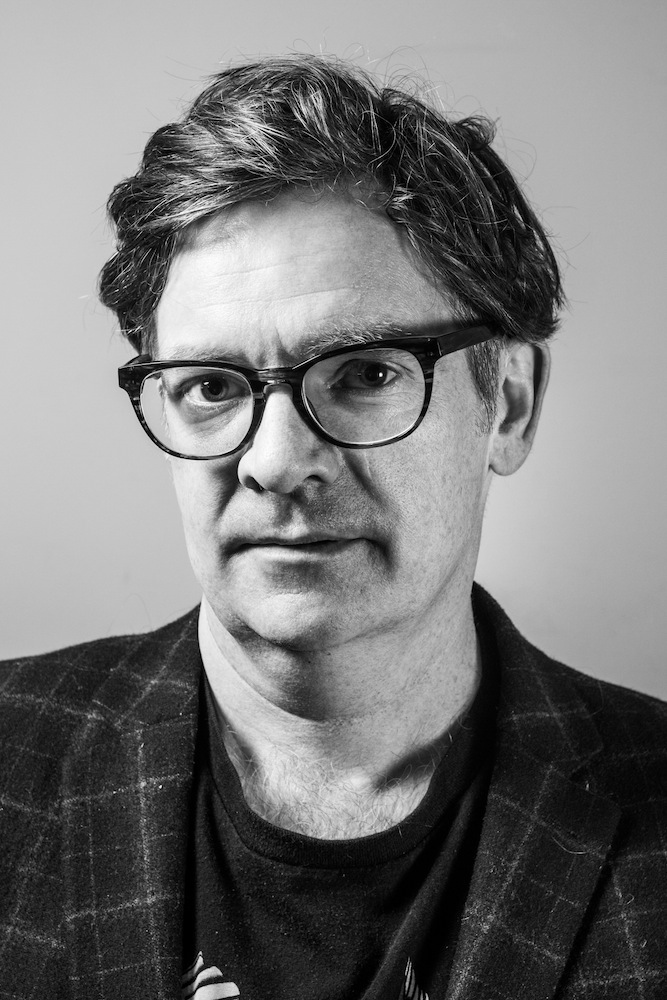
ROB SPILLMAN IN NEW YORK, MARCH 2016. PHOTO: MARK DAVIS.
Recalling one’s own childhood is unquestionably a creative act, blending myth, fantasy, fact, a cast of unusual characters, extremely detailed settings, and a dose of self-deception. We’re all part-time writers when it comes to our past. Truly exceptional memoirs have to do something more than recount a good origin story: they have to test the author’s youthful understanding of the world, and break down that world, even as it’s being built upon the page.
Rob Spillman’s All Tomorrow’s Parties (Grove Press) is such a memoir. Not only is it a super-fun, shatter-the-mirror joyride through Spillman’s eccentric upbringing, but it’s also replete with insightful double visions. The structure alternates between the author’s formative years growing up in Berlin as the son of two divorced classical musicians (before hopping all around America between homes) and Spillman as a young man travelling back to Berlin with wife, the writer Elissa Schappell, right before the city’s reunification in 1990. This clever two-step juxtaposition allows for the friction of different Spillmans to materialize. But even more than that, within each chapter, the author manages to invoke both the dreamy, mythic version of life amid art and interesting scenery, and all the chaos and cracks and potential car crashes that threaten it.
Too, often, critics compliment memoirs for their “unflinching” portrayals; this word should be banned merely for overuse. What I especially loved about All Tomorrow’s Parties is that the narrator does flinch, which is what humans do. He flinches on a balcony in Aspen as an early teen when a friend connects the dots that Robbie’s father is gay, and he flinches a decade later in East Berlin when he realizes that he and his wife strolled by a group of soldiers who could have easily attacked them without any repercussion. Mostly, though, All Tomorrow’s Parties is such a thrill to read because its author taps into that spirit and madness and loudness and unquenchable wanting in youth—complete with a song suggestion at the start of each chapter. I spoke with Spillman, who is also the founder and editor of the literary publication Tin House, on the phone. He was in Minneapolis, on a leg of his cross-country book tour.
CHRISTOPHER BOLLEN: In a lot of ways, All Tomorrow’s Parties is two memoirs in one. There’s your childhood moving from Berlin to America, and there’s your young adult adventure in Europe. But they are smartly interspersed, breaking each other up. You could have simply connected them in chronological order.
ROB SPILLMAN: It took me 10 years to write the book. For the first seven years, I was writing it chronologically and trying to figure out exactly how to do it. But it was lopsided and weird and I was bored with myself, with those stories. And if I was bored with myself, I was thinking, “Oh, no.” So it took me quite a long time to figure out the structure and how to get the Berlin of 1990 to the front of the book. By alternating it, I was able to do that. I wish I could say I just whipped it off like that, but it was really seven years of total failure and struggle. I wouldn’t say total failure because I was excavating the material and interrogating myself, so with each draft I felt like I was getting more and more honest and more comfortable exposing myself, which I had kind of spent my entire life avoiding.
BOLLEN: We tend to be taught from a young age not to expose ourselves. [laughs]
SPILLMAN: Yeah. Just culturally, from the circumstance of my upbringing to being an editor and curator, I’m more comfortable with putting other people forward. So I was struggling with that.
BOLLEN: I’m curious about this shift from being an editor to being a writer. It seems to me that lately several editors have made the transition quite spectacularly. Did writing feel like a natural act for you? Did it grow out of your work at Tin House or did it feel like two separate cells?
SPILLMAN: It was hard for me to turn off my critical self when faced with a purely creative self, because that critical self is my day job. With Tin House I’m reading all these people who are really pushing the form and working right on the edge, like Maggie Nelson and Mary Ruefle and Charles D’Ambrosio and Nick Flynn. I know what’s possible and that’s also one of the challenges. I know what’s getting published. I had to turn that side of my brain off. And the first couple of years I was writing, in the back of my mind I was thinking, “Oh, I know what this going to look like when I publish it.” Then I rounded a corner to where I didn’t care if it was going to get published. I was more interested in putting the material down.
BOLLEN: Knowing the inside of an industry too well can backfire. I think with writing, you need to make it up as you go along and exist in an almost Don Quixote-like state of belief.
SPILLMAN: Particularly in New York, when you’re working in publishing it’s sort of like working in a casino. All the noise is amplified. You keep hearing, “six-figure deal, six-figure deal, six-figure deal.” There’s this noise and hype and hot young thing, which has nothing to do with art.
BOLLEN: Maybe that’s the advantage of Iowa for writers. They can’t hear the casino.
SPILLMAN: Absolutely.
BOLLEN: You were writing a novel when you returned to Berlin as a young man called Coffee and Absinthe. I was curious what it was about and, as a writer, I was horrified when you destroyed the pages at the end. [laughs] I wanted to reach into the book and say, “Wait, you may want to use some of the nuts and bolts later.” You didn’t think about trying again on the novel instead of doing a memoir?
SPILLMAN: Yeah, I’ll have to go see if there’s a draft somewhere hidden away, but I can remember it was pretty cringe worthy. [laughs] I wanted to investigate my feelings about the time, and my raw material was so fantastic that I didn’t even need to make anything up. I tended to ham up my material, like, “I grew up backstage in the queer opera world.” And my wife was always like, “Oh, god, here we go again!”
BOLLEN: But your childhood really is fantastic raw material. I thought it was only people like me who grew up in the boring suburbs who needed to come to New York in search of a creative community. But you grew up in this bastion of a wild, creative community. Perhaps when you got to Baltimore it was more suburban and sterile. But, honestly, after your itinerant life as a kid, I would have expected you to look for something more settled.
SPILLMAN: I think once I experienced that life I loved it. I loved being around people living for their art. They were all living through their art and didn’t consider what they were doing work, so I couldn’t think of anything other than that. Especially when you look at people who hate their jobs and are just punching the clock. I’d much rather eat ramen and do something that I love.
BOLLEN: Do you think that had a lot to do with the fact that you grew up as the son of two musicians as opposed to the son of two writers? It’s a more dynamic and communal situation. Writers or artists tend to lock themselves away and work.
SPILLMAN: Yeah, that’s true. It’s sort of immediate gratification. You have the rehearsals and the constant performances so you see sort of the results of their labor constantly versus writing.
People tend not to know what you’re doing when you’re a writer. “Oh, yeah. I’m going to write a novel…when I’m finished being a stockbroker I’m just going to sit down and write a novel.” I hear that all the time. And I’m like, “Okay, good luck with that.”
BOLLEN: As a kid you were alive to so many unusual experiences. But, of course, there’s that semi-heartbreaking moment in the book when a friend tells you that your father is gay. It’s kind of amazing that it hadn’t occurred to you earlier.
SPILLMAN: I think because everybody was gay around me it didn’t mean anything until someone pointed it out. Because literally everybody I was around was gay. No one was really in the closet. I was pretty blind to my surroundings.
BOLLEN: Have you been back to Berlin in recent years to see the changes post-Reunification?
SPILLMAN: Not in a while. Weirdly my daughter just went and she retraced my steps and would send me photos and reports. She read my book and she was like, “It sure looks like Park Slope… strollers and overpriced coffee bars.” I was like, “Yeah, it’s been 20 years. That’s what happens.” It was such a prime location. But, no, I haven’t been back in a while.
BOLLEN: Do you think you would have stayed if your wife hadn’t gotten sick? For years after, did you put yourself back in East Berlin, wondering what might have been?
SPILLMAN: I don’t think I would have stayed. I think I was starting to see the light of my own delusion. I think if Elissa hasn’t had a seizure we might have hung on until reunification. But as soon as unification happened we would have been screwed because the laws would have kicked in and we would have been evicted. It would have been very messy because they cleaned up pretty quickly. All the anarchist squats got flushed out.
BOLLEN: When you sat down to write on 1990 Berlin, did you rely on notes or your memory or did you do research? It’s tricky to get such rich details on a place so long back in the rearview mirror.
SPILLMAN: I actually channeled all of my writing into my journals during that time. I kept pretty extensive journals and diaries. So did Elissa, so I looked at hers as well as mine and that really helped. I looked at a lot of historical photos too. There were a lot of photos from the year the Wall came down that helped me with the descriptions of the time and place. It kick-started it. Being 1990, it was the days of pre-digital cameras so I have exactly 12 pictures from that time. I have about one roll of black-and-white film. I think my memories might be sharper because of that in some way, because I had to rely on them more.
BOLLEN: Looking back, did you connect more with the boy who was growing up in Berlin or the young man who returned to reclaim it? Did they even seem like the same person?
SPILLMAN: I was working on them in juxtaposition with each other, so it kind of brought home how they influenced each other. I came to see how close they were. For so long I had made a myth of my childhood—it was almost a myth of Eloise in the Plaza. Then you look at it closely, even at the few photos I have of me as a kid, and how blank and scared I looked. It felt like, “Whoa, what was going on?” I’d built this protective myth around my own story that I wanted to look at, and there was a lot more going on than I knew. Being a parent myself really changed the way that I saw my own childhood. Being responsible for another human definitely puts things in perspective. Because I would have looked back on my father and me and thought, “Oh, no big deal traipsing around the Eastern Bloc with your small child.”
BOLLEN: I can’t believe your father hid his money in your shoe when you both crossed over. Have you parents read the book? I hate to ask that question because it sounds like you’re trying to get your parent’s approval, but I am particularly curious about how your mom felt about it.
SPILLMAN: I showed her pretty late draft, pre-galleys, and she was really surprised. Because in the book I kind of assumed she must have known this or that. She did not know. I guess I was a really good actor.
BOLLEN: She thought that the car you crashed was really stolen and spray-painted by a vandal?
SPILLMAN: I never fessed up to that. She also never knew how angry I was, which was upsetting to her. It was interesting because after she read it she came up to New York—she still lives in Baltimore—and sat at my kitchen table and we went through the whole book together. It was a long overdue conversation that we should have had many years ago. She objected to some things and questioned others, but also gave me really deep background on a lot of other parts, which I was able to use in the book and made it better. But it was… grueling, excruciating…
BOLLEN: It’s the last person you want to face, that judge at the kitchen table.
SPILLMAN: Having withstood that, I am now ready for the most horrific review ever. I can take it. But it was good. I was talking to Dorothy Allison about the process of writing this book over the years. She said you’ve got to be able to sit in a room with the people you’re writing about. I thought she meant this figuratively.
BOLLEN: [laughs] Right. Figuratively is somewhat doable.
SPILLMAN: Yeah, but actually sitting a few feet from my mother…
BOLLEN: Books haunt this memoir—all the books you were reading throughout the years. But, perhaps, even more than books, music is the real inspiration. You create a soundtrack of songs that opens each chapter. How did you choose the songs?
SPILLMAN: It came up when I created the structure. Before it had been more woven in. But part of the theme of the book is my anxiety of influence in living through other people’s music and art and writing. I wanted to make that more explicit.
BOLLEN: Well, you were raised by two classical musicians. Then there was that moment in your house in Baltimore, listening to the far end of the radio dial and hearing waves that were calling you and finding your own sound.
SPILLMAN: Yeah having grown up in such a musical household, it was my entire world. When I tuned into punk rock it was like I was able to step out of one river and into a different one. It was such a force and it was also a way for me to get out my feelings and tap into the rage and inadequacy and all of those things that punk does so well. They were expressing everything I was unable to express. I could still be the polite, adult-like kid, but I was listening to the Sex Pistols and whatever else was coming along.
BOLLEN: Music back then was so tied to the place where it was being made. For the devoted listener, there’s that feeling of needing to get to the place where the sound is vibrating the loudest.
SPILLMAN: Absolutely. That was definitely the pull of New York because that’s where the music was coming from.
BOLLEN: Do you think you found the creative community you were looking for in New York? Or did you make your own?
SPILLMAN: It was there even before I left for Berlin, but I was impatient with it. I also wasn’t willing to do the dirty work to really maximize it. One of my many problems was that I being influenced by the Beats and Paris in the ’20s and ’30s and besotted with all of those romantic visuals. But my heroes didn’t step into a scene. They made a scene. It took me a while to figure out that I had to actually roll up my sleeves and contribute to the ecosystem and make whatever it is happen—not just step in and go, “Okay, I’m here.”
BOLLEN: It seems like Elissa was a critical agent in terms of leading you toward the life you wanted. Throughout the book, Elissa is like the rational Greek chorus figure, always speaking wisely to your childish antics.
SPILLMAN: Yeah, she’s still that way. She was the one actually working in Europe while I was posing. I was a writer but I wasn’t actually putting the pen down to paper, and Elissa was cranking it out. Even when I was writing this book, I’d show her an early draft, and she’d be like, “Hmm, this Elissa character is incredible, I just would never want to meet her…” I was trying to protect her. And she said, “What are you doing? If you’re going to write it, you’ve to write it correctly.” So, yeah, she’s still that way.
ALL TOMORROW’S PARTIES IS OUT NOW VIA GROVE PRESS.


